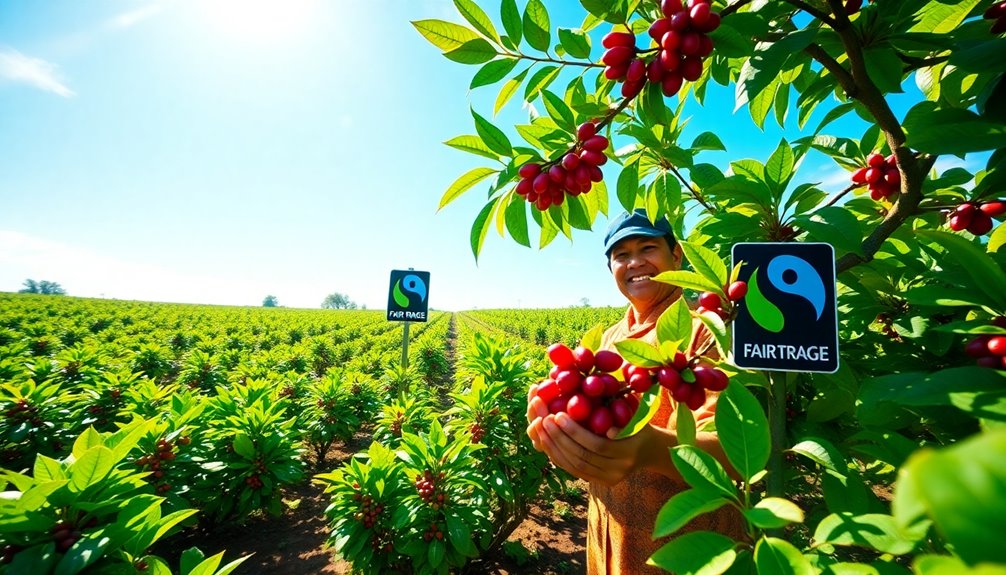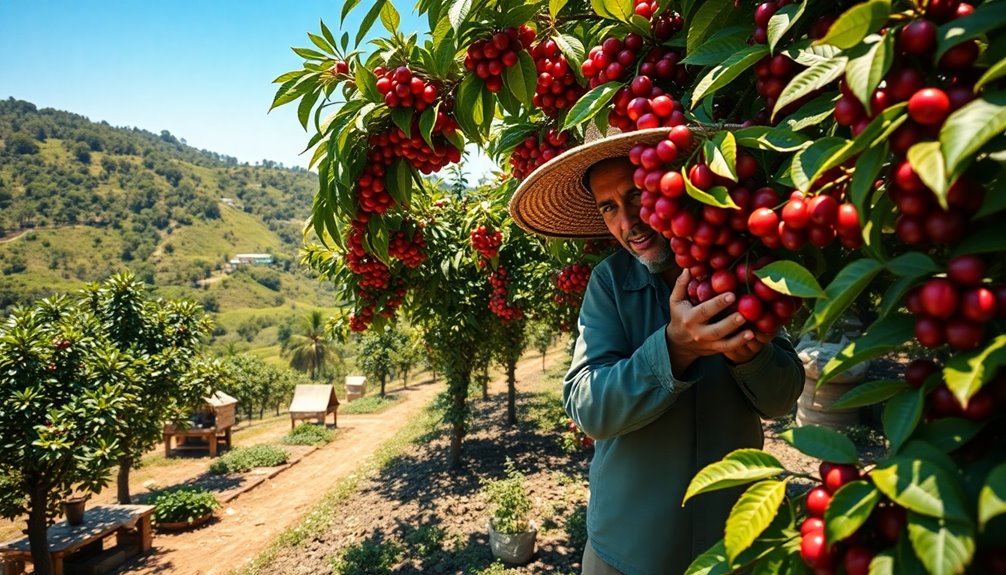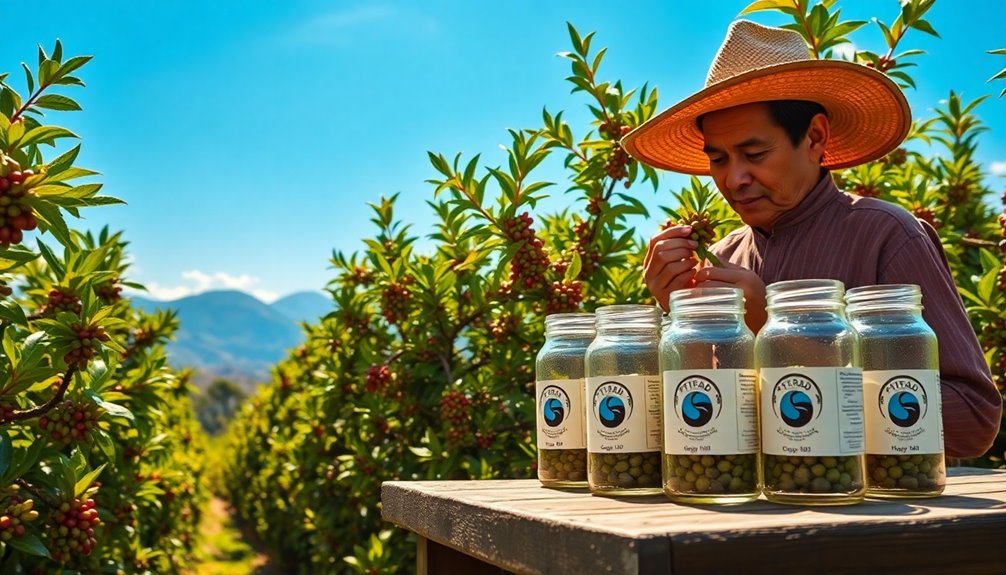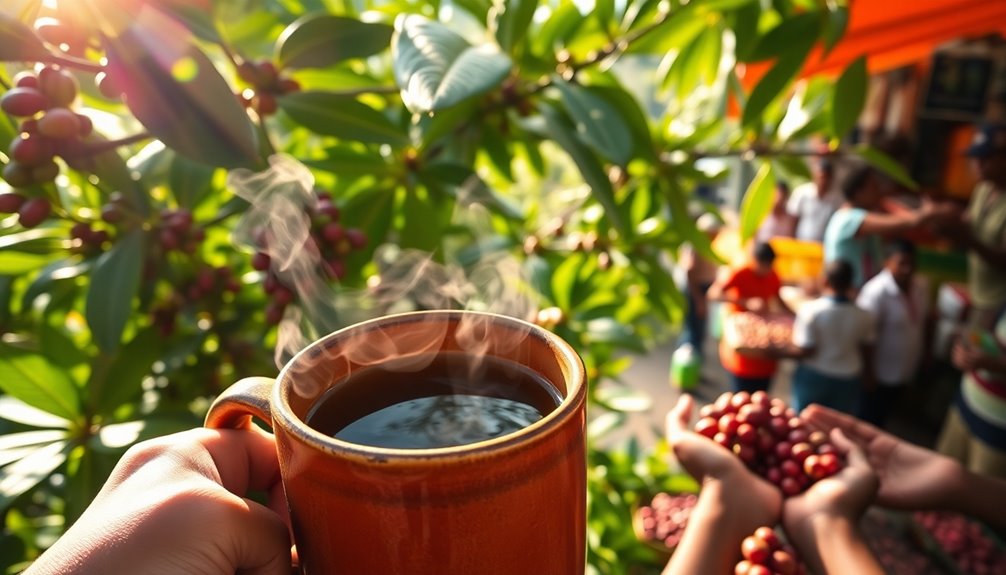Fair Trade coffee means more than just great taste; it represents a commitment to ethical sourcing and sustainability. When you choose Fair Trade, you support farmers who earn fair wages and work in decent conditions, as the certification process ensures this. By prohibiting child and forced labor, it promotes social equity while bolstering local economies. Plus, Fair Trade practices prioritize environmental health through organic farming and biodiversity protection. As consumer demand for ethically sourced coffee grows, you can make a difference with each cup. Keep exploring to uncover even more about the benefits and impact of Fair Trade coffee.
Key Takeaways
- Fair Trade Coffee ensures ethical sourcing, fair compensation for farmers, and prohibits child and forced labor, promoting social equity.
- Certification provides financial stability through minimum price guarantees and Fair Trade premiums for community projects such as schools and healthcare.
- Sustainable farming practices in Fair Trade Coffee reduce pesticide use, promote biodiversity, and safeguard local water sources, benefiting the environment.
- Consumer demand for ethically sourced products continues to grow, with a willingness to pay premium prices for Fair Trade and organic coffee.
- Challenges like climate change and market competition require adaptability and innovative solutions to sustain Fair Trade coffee production and quality.
What Is Fair Trade Coffee?

Fair Trade coffee is more than just a beverage; it's a commitment to ethical sourcing and sustainability. This coffee is certified to meet strict sustainability and labor standards throughout the supply chain, ensuring farmers receive fair compensation for their hard work.
With Fair Trade, you support better prices, decent working conditions, and fair trade terms for farmers and workers. By choosing Fair Trade, you empower farmers, particularly women, and help preserve indigenous cultures.
You also promote a system that prohibits child and forced labor, fostering social equity. The economic benefits are significant, as cooperative members earn 39% more than non-members, leading to improved living conditions and community investments.
When you sip Fair Trade coffee, you contribute to a more equitable world.
Certification Process Explained

In order to become certified as a Fair Trade coffee producer, businesses must navigate a detailed certification process that begins with an application to FLOCERT, the independent auditor.
You'll submit your application along with the required fees, and if approved, you'll receive a Permission to Trade (PTT). However, this PTT doesn't allow you to use the Fairtrade Mark on your packaging until full certification is achieved.
Next, your organization will undergo an on-site audit to ensure compliance with Fairtrade Standards. After addressing any non-conformities, FLOCERT will decide on certification.
Key Fair Trade Organizations

As you explore the landscape of Fair Trade coffee, you'll encounter several key organizations that play vital roles in promoting ethical practices and supporting producers worldwide.
Fair Trade USA focuses on expanding fair trade programs, having delivered over $1 billion in benefits since 1998.
The Fair Trade Federation promotes equitable trading partnerships among its members, ensuring adherence to fair trade principles.
Fairtrade International sets global standards, guaranteeing fair prices and supporting sustainable farming practices.
Additionally, local cooperatives, like Oromia Coffee Farmers Cooperative Union in Ethiopia, foster community development and ensure farmers receive fair prices.
These organizations work together to create direct, transparent relationships between producers and buyers, ultimately enhancing the livelihoods of millions of farmers around the globe.
Standards for Fair Trade Coffee

Standards for Fair Trade coffee ensure that producers, exporters, and traders adhere to ethical practices that benefit both communities and the environment.
To qualify for Fairtrade certification, producer organizations must be active for at least two years and show market potential, backed by a buyer's letter of intent.
Exporters need to follow the Fairtrade Standard for Coffee and maintain transparency in contracts, specifying terms like price and delivery dates.
Sustainable farming practices are vital, promoting biodiversity and safe labor conditions. This includes avoiding harmful substances and ensuring fair treatment of workers.
Economic Benefits for Farmers

While many farmers face economic uncertainty in the coffee market, Fair Trade certification offers essential financial stability. It guarantees a minimum price for coffee, covering production costs and protecting you from global price fluctuations. This security allows you to plan for the future with confidence, reducing your community's vulnerability to poverty.
You'll likely see an average income increase of 3.5 percent, with skilled growers enjoying a boost of 7.7 percent. Fair Trade premiums fund local projects like schools and healthcare, enhancing community development.
Plus, you gain more control over production and sales, reducing reliance on intermediaries. With Fair Trade, you can earn up to 15 percent more, empowering you to improve your living conditions and invest in your future.
Environmental Sustainability Initiatives

Fair Trade coffee not only boosts farmers' incomes but also emphasizes environmental sustainability. By encouraging organic farming, it minimizes harmful pesticide use, promoting healthier ecosystems.
Shade-grown coffee practices protect biodiversity and preserve vital bird habitats, while sustainable water management safeguards local water sources.
Fair trade standards mandate reduced chemical use and advocate for soil conservation, ensuring long-term land health.
Additionally, initiatives focus on preserving natural resources and preventing deforestation through reforestation efforts. Farmers are encouraged to adopt sustainable agricultural practices, like crop rotation, optimizing land use to enhance productivity with minimal environmental impact.
Certification processes, including third-party verification, maintain transparency and compliance, ensuring ongoing commitment to these vital environmental initiatives.
Coffee Production Overview

Coffee production is a meticulous process that transforms cherry-like fruits into the aromatic beans you brew each morning. It all starts with cultivation in tropical regions, where specific practices ensure high-quality beans. Once the coffee cherries are ripe, they are carefully picked by hand and undergo a series of processing steps to remove the outer skin and pulp, revealing the green coffee beans inside. These beans are then dried, sorted, and roasted to perfection, culminating in the rich and distinct flavors that coffee lovers around the world enjoy. The surprising history of coffee stretches back centuries and spans multiple continents, with its origins in Ethiopia and its spread to the Middle East, Europe, and eventually the Americas.
Once ripe, coffee cherries are harvested, often by hand or mechanically, with timing being crucial for flavor.
After harvesting, cherries undergo one of three processing methods: dry, wet, or semi-dry. Each method significantly impacts the beans' taste and quality.
Next, the milling process takes place, which includes hulling, polishing, cleaning, grading, and sorting to ensure uniformity.
Finally, green beans are roasted at high temperatures to develop their distinctive flavors and aromas. Once cooled, they're ready for you to enjoy, either as whole beans or ground.
Supply Chain Transparency

As consumers increasingly seek ethical and sustainable options, supply chain transparency has become vital in the coffee industry.
This openness allows you to trace your coffee's journey from farm to cup, revealing crucial details about working conditions, environmental impacts, and economic fairness.
With accessible information on where coffee beans are grown and how they're processed, you can make informed choices that support sustainable practices.
Transparency addresses ethical concerns like child labor and unfair wages, promoting fair trade and environmental stewardship.
It fosters direct trade relationships, ensuring farmers receive fair compensation while enhancing coffee quality.
Consumer Impact and Awareness

With growing awareness about ethical sourcing, consumers are playing a pivotal role in shaping the coffee market. About 75% of you're willing to pay more for goods that ensure fair pay for farmers.
Fair Trade shoppers, on average, spend 35% extra for certified coffee. Your desire for sustainability drives this willingness, often leading you to pay $1.36 more for eco-friendly options.
Trust in the Fairtrade mark is high, with 57% of US consumers recognizing it, which influences your purchasing decisions. Approximately 25% of you consider sustainability and fair pay when buying coffee.
This impact is evident, as Fair Trade coffee sells five times faster than traditional options, reflecting a strong demand for ethically traded products.
Future of Fair Trade Coffee

While many consumers increasingly prioritize ethical sourcing in their purchasing decisions, the future of Fair Trade coffee looks promising.
Fair Trade USA plans to maintain current pricing through 2025, which will help stabilize the market and support over 600,000 farmers globally. This approach is backed by more than 65% of stakeholders, poised to drive demand.
Sustainable farming practices continue to gain traction, improving both environmental impact and coffee quality. As the global organic coffee market grows, Fair Trade coffee sales are also rising, reflecting consumer preferences for ethically sourced products.
This trend fosters economic empowerment for farmers, enabling them to invest in their communities and adapt to climate challenges, ensuring a bright future for Fair Trade coffee. Additionally, the principles of self-acceptance in the aging process can inspire stakeholders to embrace sustainable practices that benefit both farmers and consumers alike.
Frequently Asked Questions
How Can I Identify Fair Trade Certified Coffee Brands?
To identify fair trade certified coffee brands, look for the FAIRTRADE Mark or Fair Trade Certified™ logo on the packaging.
These logos show that the coffee meets specific fair trade standards, ensuring farmers receive fair prices.
You can also check product descriptions in stores or online retailers, as they often mention fair trade certification.
Explore dedicated aisles in grocery stores or co-ops for a range of certified blends and single-origin options.
What Are Common Misconceptions About Fair Trade Coffee?
You might think that Fair Trade coffee means farmers get a fixed price, but that's not true. The Fairtrade Minimum Price acts as a safety net, allowing higher earnings for quality produce.
Also, many believe certification costs are burdensome, yet support exists to help farmers navigate these processes.
Finally, it's a misconception that higher consumer prices directly benefit small farmers; Fair Trade aims for a fairer trade system overall.
How Does Fair Trade Coffee Affect Global Coffee Prices?
Fair trade coffee affects global prices by establishing minimum price structures that increase production costs for farmers.
When fair trade prices rise, it influences market dynamics, pushing some producers to adjust their pricing strategies.
You'll see how these changes can create ripple effects in the coffee market, affecting both demand and supply.
Ultimately, fair trade pricing aims to support farmers while ensuring they can cover rising costs and maintain sustainable livelihoods.
Are There Any Fair Trade Coffee Alternatives?
Yes, there are fair trade coffee alternatives you might consider.
Direct trade cuts out the middleman, allowing farmers to earn better prices and focus on quality.
Organic and sustainable practices promote environmental preservation while supporting farmer livelihoods.
Community support initiatives, like tip-matching programs, enhance local economies.
Lastly, certification and transparency ensure ethical sourcing, giving you confidence in your coffee choices.
Explore these options to enjoy quality coffee while positively impacting communities.
How Can Consumers Advocate for Fair Trade Practices?
You can advocate for fair trade practices by educating yourself and others about its benefits.
Share your knowledge with friends and family, and use social media to spread awareness.
Support local coffee shops that prioritize fair trade products, and give feedback to retailers encouraging them to offer more.
Participate in community initiatives and events, and join campaigns that promote fair trade policies.
Your voice can drive demand and create positive change in the marketplace.
Conclusion
In conclusion, by choosing fair trade coffee, you're not just enjoying a better brew; you're also supporting farmers and promoting ethical practices. Understanding the certification process and the standards involved helps you make informed choices that benefit both communities and the environment. As the demand for transparency grows, your awareness can drive positive change in the coffee industry. So, next time you sip your coffee, remember the impact your choice has on others around the world.










